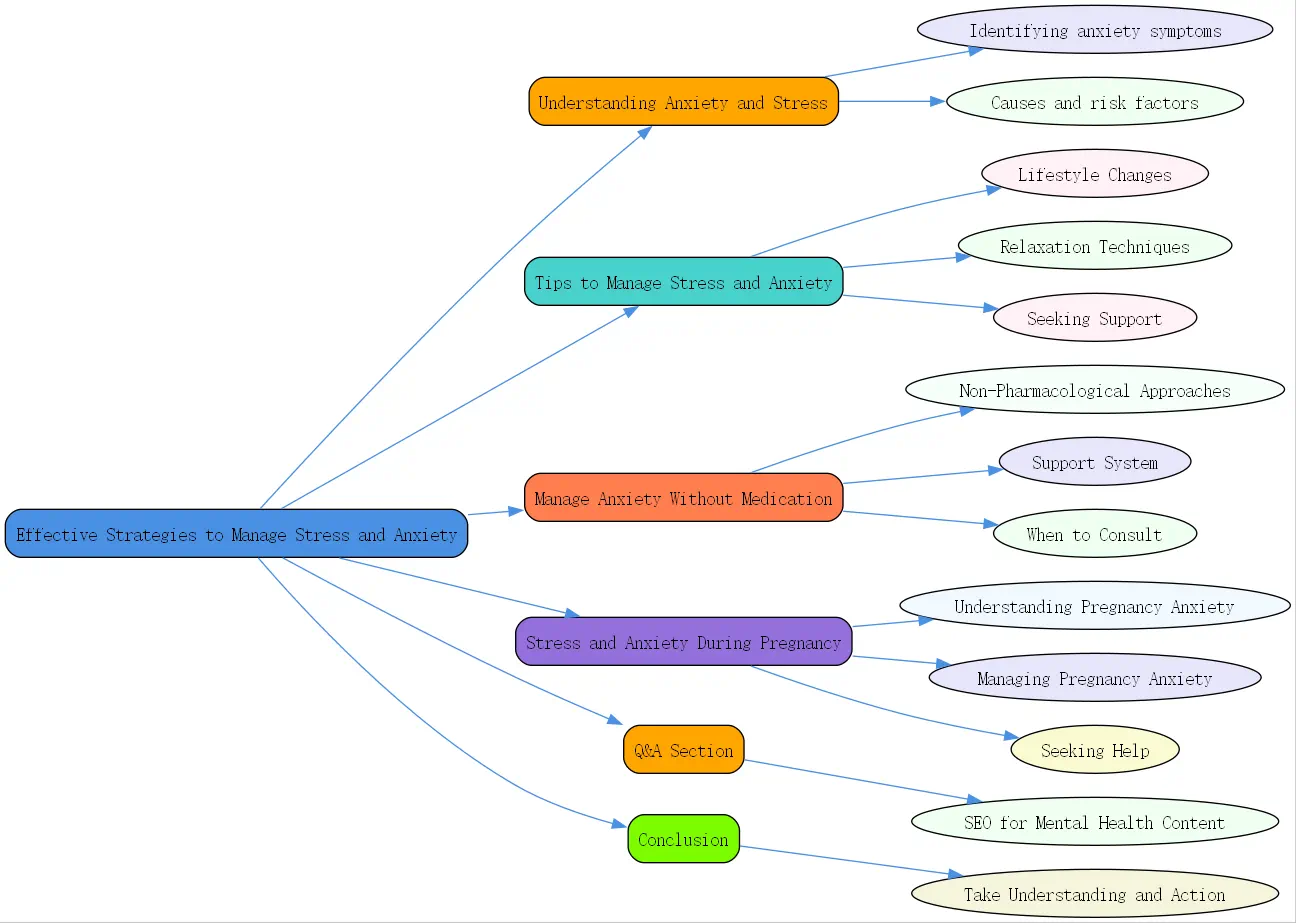How Can I Manage Stress and Anxiety Effectively?

Stress and anxiety are part of life, but they don’t have to control you. Whether it’s everyday pressures or big life events like pregnancy, knowing how to manage these feelings can make all the difference. This guide dives into practical, expert-backed strategies to help you regain balance and peace of mind.
Understanding Anxiety and Stress
Defining Anxiety and Stress
Anxiety is that nagging worry or fear about what’s ahead, while stress hits when life throws demands your way. Both are normal reactions, but they can spiral if unchecked. During pregnancy, for instance, it’s common to feel anxious about your baby’s health or your changing role as a parent.
Normal Anxiety vs. Anxiety Disorder
Feeling nervous before a big moment? That’s normal anxiety鈥攖emporary and manageable. An anxiety disorder, though, sticks around, disrupting your daily routine with persistent worry. For expectant mothers, distinguishing between typical pregnancy jitters and antenatal anxiety is key to getting the right support.
The Impact of Untreated Anxiety
Ignoring anxiety isn’t an option. Left untreated, it can lead to serious issues like preterm labor or low birth weight in pregnancy, according to studies from the American Psychological Association. It can also strain your mental and physical health, making early action essential.
Identifying Anxiety Symptoms
Emotional Symptoms of Anxiety
Anxiety often shows up as constant nervousness or uncontrollable worry. You might struggle to focus or feel irritable. For pregnant women, excessive fears about the baby’s well-being can signal it’s time to take a closer look at what’s going on.
Physical Symptoms of Anxiety
Your body can chime in too, with a racing heart, dizziness, or muscle tension. Shortness of breath or sweating might creep up, especially during pregnancy when physical changes already feel overwhelming. Recognizing these signs helps you act before they escalate.
Recognizing Panic Attacks
Panic attacks are anxiety’s intense cousins鈥攕udden, overwhelming fear that hits hard. They’re scary anytime, but during pregnancy, they might mimic labor symptoms, adding confusion. Knowing they’re manageable with breathing techniques or support can ease the panic.
Causes and Risk Factors for Anxiety
Predisposing Factors
Your genes or past experiences can set the stage. A family history of anxiety or previous struggles with mood disorders ups your risk. For some, a tough pregnancy history鈥攍ike loss or fertility issues鈥攃an amplify those worries.
Environmental Factors
Life doesn’t hold back鈥攚ork stress, home chaos, or trauma can all fuel anxiety. Big events, like losing a loved one, hit hard too. During pregnancy, lack of support or relationship strain can tip the scales, making calm harder to find.
The Connection Between Anxiety and Depression
Anxiety and depression often tag-team. They share roots in stress and can feed off each other, especially when life feels heavy. Understanding this link helps you tackle both with strategies that lift your mood and quiet your mind.
Tips to Manage Stress and Anxiety
Wondering how can I manage stress and anxiety effectively? It starts with small, doable steps that fit your life. Here’s how to take charge.
Lifestyle Changes for Stress and Anxiety Management
The Role of Exercise
Moving your body boosts serotonin and cuts stress hormones. A brisk walk or gentle yoga can shift your mood fast. Pregnant? Check with your doctor for safe options鈥攅xercise can be a game-changer for you and your baby.
Healthy Eating and Its Impact
What you eat matters. A diet packed with protein, fiber, and nutrients steadies your mood. Skip the junk and lean on whole foods鈥攖hink fruits, veggies, and lean meats. A chat with a dietitian can tailor this to your needs, especially during pregnancy.
Prioritizing Sleep for Mental Health
Sleep is your brain’s reset button. Too little, and anxiety spikes. Set a routine鈥攕ame bedtime, same wake-up鈥攁nd stick to it. It’s a simple fix that pays off big, keeping stress at bay whether you’re expecting or not.
Relaxation Techniques
Meditation and Mindfulness Practices
Meditation quiets the storm in your head. Just 10 minutes of mindfulness daily can ease tension. Focus on the present, not the 鈥渨hat ifs.??It’s a gentle, powerful tool for anyone, including moms-to-be craving calm.
Breathing Exercises for Anxiety Relief
Deep breathing is a quick win. Try slow, abdominal breaths for 20 minutes鈥攐xygen flows, nerves settle. It’s portable and free, perfect for tackling anxiety spikes at home or on the go.
Seeking Support and Therapy
Benefits of Counseling and Therapy
Talking it out works wonders. Therapy, like Cognitive Behavioral Therapy (CBT), rewires negative thoughts. It’s a safe space to unpack fears, and for pregnant women, it can lighten the emotional load of those nine months.
Joining Support Groups
You’re not alone. Support groups connect you with others who get it鈥攕haring tips and stories builds strength. Check out BrainTalking’s community resources for groups that fit your journey.
How to Manage Anxiety and Depression Without Medication
Medications aren’t the only answer. Here’s how to manage anxiety and depression without medication, naturally and effectively.
Non-Pharmacological Approaches
Cognitive Behavioral Therapy (CBT)
CBT is gold-standard stuff. It helps you spot and flip harmful thought patterns. Sessions with a therapist can cut anxiety and depression down to size, no pills needed鈥攋ust your willingness to dive in.
Interpersonal Psychotherapy
This therapy zooms in on relationships. Improving how you connect with others can lift your mood and ease anxiety. It’s a practical, talk-based fix that tackles root causes head-on.
Creating a Support System
The Importance of Social Connections
Friends and family are your lifeline. Strong ties reduce isolation and boost resilience. Lean on them鈥攃offee chats or phone calls can lighten the heaviest days.
Seeking Help from Loved Ones
Don’t go it alone. Ask for support when you need it鈥攍oved ones can listen or lend a hand. It’s a simple step that builds a safety net around you, medication-free.
When to Consult a Doctor
Recognizing When Professional Help is Needed
If anxiety or depression stalls your life, it’s doctor time. Frequent panic or unrelenting sadness? Don’t wait鈥攅xperts can guide you, with or without meds.
Discussing Medication Options
Sometimes pills are part of the plan. Talk pros and cons with your doc鈥攅specially if pregnant. Safety for you and your baby comes first, and they’ll steer you right.
How to Manage Stress and Anxiety During Pregnancy
Pregnancy brings joy鈥攁nd worry. Here’s how to manage stress and anxiety during pregnancy with confidence.
Understanding Anxiety During Pregnancy
Common Fears and Concerns
Will my baby be okay? Will I be a good mom? These questions are normal. Over 1 in 10 pregnant women face antenatal anxiety, per 2025 research from the National Institute of Mental Health. Naming those fears is step one.
Hormonal Changes and Their Effect
Hormones swing wild during pregnancy, stirring up emotions. That’s why stress feels bigger鈥攜our body’s adjusting. Regular doctor visits keep tabs on this rollercoaster, helping you cope.
Managing Anxiety During Pregnancy
Safe Exercise During Pregnancy
A little movement goes far. Walking or prenatal yoga cuts stress, boosts mood. Always ask your doctor first鈥攕afety’s key, and they’ll recommend what’s best for you.
Healthy Diet for Pregnant Women
Food fuels your calm. Load up on nutrients鈥攖hink leafy greens, nuts, and lean proteins. A dietitian can craft a plan to steady your mind and body through pregnancy.
Establishing a Sleep Routine
Rest is non-negotiable. A set sleep schedule fights anxiety and fatigue. Aim for 7-9 hours鈥攜our baby benefits too, growing strong while you recharge.
Seeking Help During Pregnancy
Consulting Your Doctor
Feeling swamped? Tell your doctor. They’ll spot antenatal anxiety and suggest fixes鈥攖herapy, lifestyle tweaks, or more. Early chats keep you and baby thriving.
Medication During Pregnancy: Risks and Benefits
Meds can help, but weigh them carefully. Some are safe, others risky for your baby. Your doctor’s expertise ensures decisions prioritize health鈥攜ours and your little one’s.
Q&A Section
Q: How can I boost my site’s SEO for mental health content? A: Start with keyword research鈥攖ools like Google Keyword Planner uncover terms like 鈥渢ips to manage stress and anxiety.??Write top-notch, researched content that solves readers’ problems. Link internally to pages like BrainTalking’s stress guide and externally to trusted sites. Optimize meta tags, speed up your site, and make it mobile-friendly. Focus on user experience鈥攃lear navigation keeps visitors hooked.




